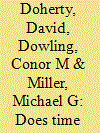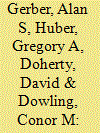| Srl | Item |
| 1 |
ID:
110657


|
|
|
|
|
| Publication |
2011.
|
| Summary/Abstract |
Previous analysis finds that people respond differently to "financial" (e.g., tax evasion) and "moral" (e.g., sexual misconduct) political scandals. However, experimental and observational studies tend to reach different conclusions about which type of scandal induces a stronger negative reaction from the public. We use an experiment embedded in a national survey to examine the possibility that these divergent findings can, in part, be explained by a failure to consider the effects of abuses of power. Consistent with previous experimental work, we find that people respond more negatively to financial scandals than to moral scandals when they do not involve abuses of power. However, abuses of power substantially affect responses to both types of scandals. We also find that moral and financial scandals affect personal and job evaluations of a politician differently. These findings support our contention that to understand public responses to scandal, it is crucial to consider the relationship between the scandalous behavior and the official's formal responsibilities.
|
|
|
|
|
|
|
|
|
|
|
|
|
|
|
|
| 2 |
ID:
131673


|
|
|
| 3 |
ID:
099289


|
|
|
|
|
| Publication |
2010.
|
| Summary/Abstract |
Previous research on personality traits and political attitudes has largely focused on the direct relationships between traits and ideological self-placement. There are theoretical reasons, however, to suspect that the relationships between personality traits and political attitudes (1) vary across issue domains and (2) depend on contextual factors that affect the meaning of political stimuli. In this study, we provide an explicit theoretical framework for formulating hypotheses about these differential effects. We then leverage the power of an unusually large national survey of registered voters to examine how the relationships between Big Five personality traits and political attitudes differ across issue domains and social contexts (as defined by racial groups). We confirm some important previous findings regarding personality and political ideology, find clear evidence that Big Five traits affect economic and social attitudes differently, show that the effect of Big Five traits is often as large as that of education or income in predicting ideology, and demonstrate that the relationships between Big Five traits and ideology vary substantially between white and black respondents.
|
|
|
|
|
|
|
|
|
|
|
|
|
|
|
|